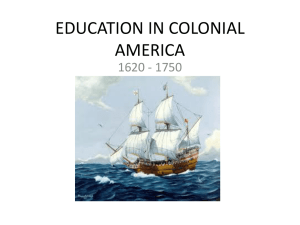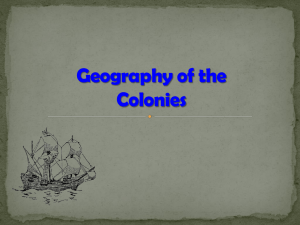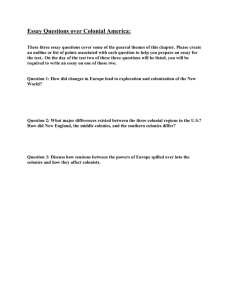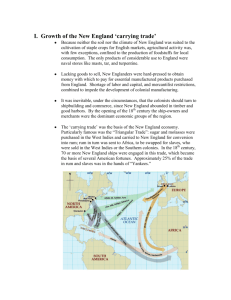Topic 5.1 The Imperial Problem
advertisement
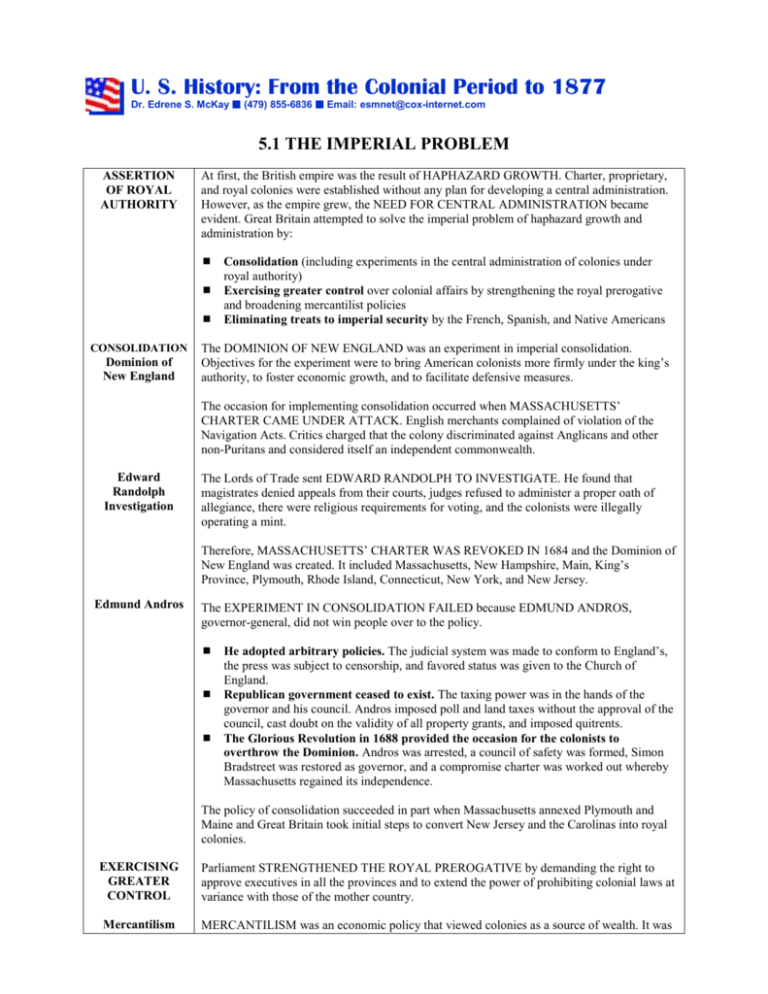
U. S. History: From the Colonial Period to 1877 Dr. Edrene S. McKay ! (479) 855-6836 ! Email: esmnet@cox-internet.com 5.1 THE IMPERIAL PROBLEM ASSERTION OF ROYAL AUTHORITY At first, the British empire was the result of HAPHAZARD GROWTH. Charter, proprietary, and royal colonies were established without any plan for developing a central administration. However, as the empire grew, the NEED FOR CENTRAL ADMINISTRATION became evident. Great Britain attempted to solve the imperial problem of haphazard growth and administration by: " Consolidation (including experiments in the central administration of colonies under royal authority) " Exercising greater control over colonial affairs by strengthening the royal prerogative and broadening mercantilist policies " Eliminating treats to imperial security by the French, Spanish, and Native Americans CONSOLIDATION Dominion of New England The DOMINION OF NEW ENGLAND was an experiment in imperial consolidation. Objectives for the experiment were to bring American colonists more firmly under the king’s authority, to foster economic growth, and to facilitate defensive measures. The occasion for implementing consolidation occurred when MASSACHUSETTS’ CHARTER CAME UNDER ATTACK. English merchants complained of violation of the Navigation Acts. Critics charged that the colony discriminated against Anglicans and other non-Puritans and considered itself an independent commonwealth. Edward Randolph Investigation The Lords of Trade sent EDWARD RANDOLPH TO INVESTIGATE. He found that magistrates denied appeals from their courts, judges refused to administer a proper oath of allegiance, there were religious requirements for voting, and the colonists were illegally operating a mint. Therefore, MASSACHUSETTS’ CHARTER WAS REVOKED IN 1684 and the Dominion of New England was created. It included Massachusetts, New Hampshire, Main, King’s Province, Plymouth, Rhode Island, Connecticut, New York, and New Jersey. Edmund Andros The EXPERIMENT IN CONSOLIDATION FAILED because EDMUND ANDROS, governor-general, did not win people over to the policy. " He adopted arbitrary policies. The judicial system was made to conform to England’s, the press was subject to censorship, and favored status was given to the Church of England. " Republican government ceased to exist. The taxing power was in the hands of the governor and his council. Andros imposed poll and land taxes without the approval of the council, cast doubt on the validity of all property grants, and imposed quitrents. " The Glorious Revolution in 1688 provided the occasion for the colonists to overthrow the Dominion. Andros was arrested, a council of safety was formed, Simon Bradstreet was restored as governor, and a compromise charter was worked out whereby Massachusetts regained its independence. The policy of consolidation succeeded in part when Massachusetts annexed Plymouth and Maine and Great Britain took initial steps to convert New Jersey and the Carolinas into royal colonies. EXERCISING GREATER CONTROL Parliament STRENGTHENED THE ROYAL PREROGATIVE by demanding the right to approve executives in all the provinces and to extend the power of prohibiting colonial laws at variance with those of the mother country. Mercantilism MERCANTILISM was an economic policy that viewed colonies as a source of wealth. It was 5.1 The Imperial Problem Page 2 based on the premise that national wealth and power were best served by increasing exports and collecting precious metals in return. It involved a collection of measures designed to keep the mother country prosperous by ECONOMIC REGULATION OF ITS COLONIES. Navigation Acts Great Britain broadened its mercantilist policies by amending and enforcing the existing NAVIGATION ACTS: " The Navigation Act (1696) was an attempt to plug the loopholes in earlier laws by providing for more effective enforcement. " The Board of Trade (1696) was to oversee colonial administration and make recommendations to Parliament. " Courts of Vice-Admiralty were established in the colonies to try (without juries) infringements of the various acts of trade. " Various acts were established to limit colonial industry: The WOOLENS ACT (1699) provided that no woolen goods could be transported from one colony to another or to any foreign country. The HAT ACT (1732) prohibited the exportation of hats from one colony to another, or to England or Europe. The IRON ACT (1750) forbade construction of new mills, forges or furnaces. The MOLASSES ACT (1733) provided relief to the British sugar colonies by establishing prohibitive duties on imports into the mainland colonies from foreign islands. ELIMINATING THREATS TO IMPERIAL SECURITY DISCUSSION QUESTIONS In an attempt to ELIMINATE VARIOUS THREATS TO IMPERIAL SECURITY, Great Britain involved the colonies in A SERIES OF WARS: " King William’s War (1689-1697). Called the War of the League of Augsburg in Europe, this war pitted the British against the French. There was no change to colonial boundaries. " Queen Anne’s War (1703-1713). Called the War of Spanish Succession in Europe, this war involved the British against the French and Spanish. By the Treaty of Utrecht (1713), England acquired Nova Scotia, the Hudson Bay area and Newfoundland. " King George’s War (1745-1748). Called the War of Austrian Succession in Europe, this war was between England and France and Spain. By the Treaty of Aix-la-Chapelle, Fort Louisbourg) which the colonists had secured) was surrendered to France in return for Madras in southern India. " French and Indian War (1756-1763). This war was fought between England and France and Spain. By the Treaty of Paris (1763), France surrendered almost all her possessions in India, all of Canada, all her territory east of the Mississippi (except the Island of Orleans at the mouth of the Mississippi) and several of the French West Indies to England. France compensated Spain for her loss of the Floridas (which went to England) by surrendering the Louisiana territory and the Island of Orleans. How do you explain the illegal activities which led to the revocation of Massachusetts’ charter? Why were English merchants so critical of the colonists’ actions? If Edmund Andros that been more diplomatic in his relations with New Englanders, do you think he might have secured support for the Dominion of New England? How did the policy of mercantilism benefit Great Britain? Was it to the benefit or the detriment of the colonies? How do you think colonists viewed such navigation acts as the Woolens Act, Hat Act, Iron Act and Molasses Act? Did participation in the wars to eliminate threats to imperial security benefit the colonies?
